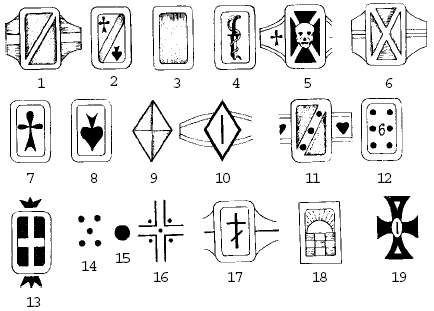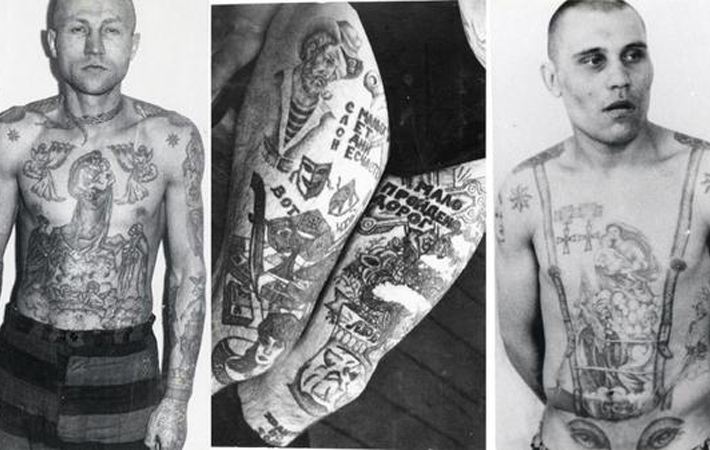Russian prison ring finger tattoos and their meaning
Prisons around the world hold inmates sporting ornate and cryptic tattoos. Much time has been spent trying to decipher their meanings. Many of these tattoos symbolize ranks, deeds and personal details of the bearer. Most of the known designs of Russian prison tattoos came around thanks to retired Russian police man Arcady Bronnikov who put together a large portfolio of existing tattoos from 1960 – 1980s. He was responsible for documentation and interviewing of Russian convicts of that time. Throughout 30 years he has created the largest archive known today, perhaps the most interesting of which is the ring tattoo.
Prison ring tattoos are considered a classic tattoo and often play the role of a business card. When prisoners first meet, it is a quick way to get the overall picture of each others' status. Rings tattoos are worn not only by men, but also by some women. They are very similar to the men's tattoos and usually signify they are career criminals.
Unlike other body markings, ring tattoos are generally not made against the bearer's will. There are some exceptions. For example, tattoos that symbolize the lowest ranks, often the most humiliating, are done against person's will, so in the event of a convict's transfer to another prison his/her rank will be well known and he/she will not be able to take a higher hierarchical spot than what was assigned.
Finger prison tattoos are made look like rings, and are tattooed on the finger thus.

Here is the main variety of documented ring tattoos and suggestions on approaching such individuals (at the time):
- 1. "Was incarcerated." This tattoo plays purely informational role, anyone can get it as long as they have been incarcerated.
- 2. "Wasted childhood." Convicts that spent their childhood in confinement tend to get this tattoo.
- 3. "Served my sentence whole." This means that the convict served his whole sentence without parole or amnesty. If spoken to this individual, it is suggested to use as less of prison jargon as possible, especially if you do not possess the complete knowledge of it.
- 4. "Served for murder or assault." There are two types of people who wear this finger tattoo. One can be a real cold blooded killer; those have to be dealt with caution. The other type was under influence when committed the crime; who despite the tattoo, can be soft and easy going. In either case, they should be dealt with balanced civility.
- 5. "Convicted for battery." Convicts who wear this tattoo should be dealt with caution. Do not approach them trying to establish dominance, but also do not let them offend you.
- 6. "Convicted for robbery." Usually people who engage in battery are more cowardly. They are less eager to attack groups of people and tend to target individuals. If you share a cell with a convict that wears this tattoo, try not to gamble with him or her; do not poke to much fun in front of over inmates. Even though they will not attack you directly, they might attack you when you least expect them, for example, in your sleep.
- 7. "Convicted for theft." This tattoo is associated with thieves and people who feel the need of creating associative groups, so called gangs and other syndicates. The way to behave around them is to politely deny all their offerings, and be careful with words. Keep more to yourself, because they will use anything against you.
- 8. "Convicted for Disorderly Conduct." This tattoo can also be applied on the ear buds, can also be read as "prosperity for violence" or "can't be rehabilitated." The only way to deal with them is to force strict rules and administer swift punishment if those rules are broken.
- 9. "Denier." The owner of this finger tattoo is very negative of law enforcement. They also are negative about convicts who decided to aid law enforcement. It is known that the owner of this finger tattoo is a high ranking individual among thieves.
- 10. "The man." This finger tattoo reads that this individual has nothing to do with career criminals and does not want to go up in the ranks. This is the most likable mind set and they are less likely to be aggressive, but still caution is required.
- 11. "Rooster or Homosexual." This finger tattoo symbolizes the lowest rang of all in the criminal world. All convicts try to avoid individuals who have this tattoo. The status of a "Rooster" is given to an individual with a lower will power or to those who were convicted for rape or rape attempt, or to those who were incapable of paying their card debt. This tattoo is usually made against the individual's will. Communication with a convict that owns that rank is detrimental to your reputation and can result in you receiving the same tattoo. It is advised not to communicate with "Roosters" much, but also not to be too disrespectful either.
- 12. "Sixer." This finger tattoo implies that the individual servers one of the pod bosses and does choirs for them. It is advised to be careful with "sixes" since they tend to spy on the whole pod.
- 13. "Path through crosses." This tattoo symbolizes that the individual that was under investigation spent time in remand. The crown in this case symbolizes that the individual conflicted with law while being in remand and possibly was a pod boss.
- 14. "Three towers and 3K." Design illustrating correctional institutions. Individuals with this finger tattoo want you to know that they have been incarcerated.
- 15. "Dot." Symbolizes possible escapes from correctional facilities. The number of dots or crosses means attempts.
- 16. "One among friends." The owner of this tattoo has been incarcerated.
- 17. "Memory of Parents" or "I am Murderer." This design symbolizes a long memory about individual's parents that passed away while the individual was incarcerated. But there might be another meaning. The individual is trying to bring revenge to the members of law enforcement. Hill with lines through it means this individual did what he /she wanted.
- 18. "Following beloved father's steps." This design is used by offspring of convicted criminals.
- 19. "Convicted for rape."
While some of the tattoos and there meanings have changed over time, it is very important to continue the study and documentation of these tattoos, as they are a means of understanding the inner workings of prison culture.

